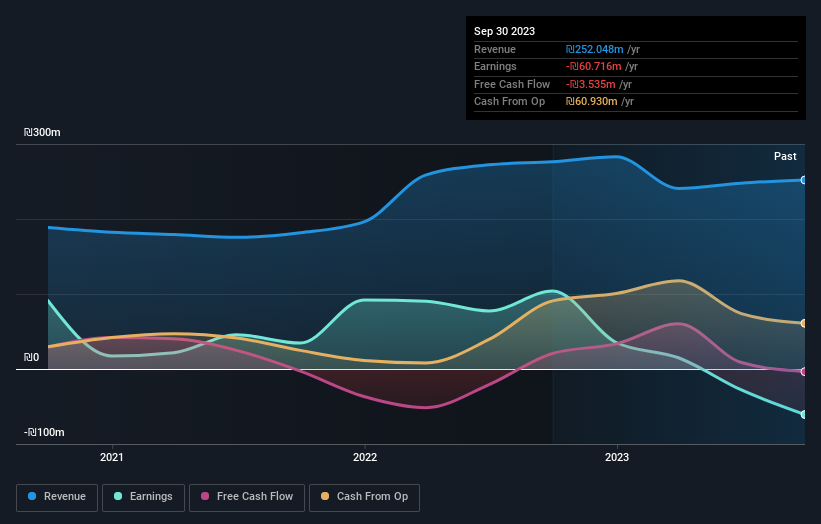Stock Analysis
- Israel
- /
- Real Estate
- /
- TASE:ASGR
Recent 12% pullback would hurt Aspen Group Ltd. (TLV:ASGR) insiders

Key Insights
- Aspen Group's significant insider ownership suggests inherent interests in company's expansion
- The top 2 shareholders own 56% of the company
- Institutions own 34% of Aspen Group
To get a sense of who is truly in control of Aspen Group Ltd. (TLV:ASGR), it is important to understand the ownership structure of the business. The group holding the most number of shares in the company, around 51% to be precise, is individual insiders. Put another way, the group faces the maximum upside potential (or downside risk).
As market cap fell to ₪390m last week, insiders would have faced the highest losses than any other shareholder groups of the company.
Let's take a closer look to see what the different types of shareholders can tell us about Aspen Group.
Check out our latest analysis for Aspen Group

What Does The Institutional Ownership Tell Us About Aspen Group?
Institutions typically measure themselves against a benchmark when reporting to their own investors, so they often become more enthusiastic about a stock once it's included in a major index. We would expect most companies to have some institutions on the register, especially if they are growing.
As you can see, institutional investors have a fair amount of stake in Aspen Group. This suggests some credibility amongst professional investors. But we can't rely on that fact alone since institutions make bad investments sometimes, just like everyone does. It is not uncommon to see a big share price drop if two large institutional investors try to sell out of a stock at the same time. So it is worth checking the past earnings trajectory of Aspen Group, (below). Of course, keep in mind that there are other factors to consider, too.

Aspen Group is not owned by hedge funds. Looking at our data, we can see that the largest shareholder is Rony Zarom with 46% of shares outstanding. In comparison, the second and third largest shareholders hold about 9.7% and 8.8% of the stock.
After doing some more digging, we found that the top 2 shareholders collectively control more than half of the company's shares, implying that they have considerable power to influence the company's decisions.
Researching institutional ownership is a good way to gauge and filter a stock's expected performance. The same can be achieved by studying analyst sentiments. Our information suggests that there isn't any analyst coverage of the stock, so it is probably little known.
Insider Ownership Of Aspen Group
The definition of an insider can differ slightly between different countries, but members of the board of directors always count. Management ultimately answers to the board. However, it is not uncommon for managers to be executive board members, especially if they are a founder or the CEO.
Insider ownership is positive when it signals leadership are thinking like the true owners of the company. However, high insider ownership can also give immense power to a small group within the company. This can be negative in some circumstances.
Our most recent data indicates that insiders own the majority of Aspen Group Ltd.. This means they can collectively make decisions for the company. That means they own ₪200m worth of shares in the ₪390m company. That's quite meaningful. Most would argue this is a positive, showing strong alignment with shareholders. You can click here to see if those insiders have been buying or selling.
General Public Ownership
The general public, who are usually individual investors, hold a 13% stake in Aspen Group. While this group can't necessarily call the shots, it can certainly have a real influence on how the company is run.
Next Steps:
I find it very interesting to look at who exactly owns a company. But to truly gain insight, we need to consider other information, too. Consider for instance, the ever-present spectre of investment risk. We've identified 3 warning signs with Aspen Group , and understanding them should be part of your investment process.
Of course this may not be the best stock to buy. Therefore, you may wish to see our free collection of interesting prospects boasting favorable financials.
NB: Figures in this article are calculated using data from the last twelve months, which refer to the 12-month period ending on the last date of the month the financial statement is dated. This may not be consistent with full year annual report figures.
Valuation is complex, but we're helping make it simple.
Find out whether Aspen Group is potentially over or undervalued by checking out our comprehensive analysis, which includes fair value estimates, risks and warnings, dividends, insider transactions and financial health.
View the Free AnalysisHave feedback on this article? Concerned about the content? Get in touch with us directly. Alternatively, email editorial-team (at) simplywallst.com.
This article by Simply Wall St is general in nature. We provide commentary based on historical data and analyst forecasts only using an unbiased methodology and our articles are not intended to be financial advice. It does not constitute a recommendation to buy or sell any stock, and does not take account of your objectives, or your financial situation. We aim to bring you long-term focused analysis driven by fundamental data. Note that our analysis may not factor in the latest price-sensitive company announcements or qualitative material. Simply Wall St has no position in any stocks mentioned.
About TASE:ASGR
Aspen Group
Aspen Group Ltd. owns, manages, and leases real estate properties in Israel and Europe.
Slightly overvalued unattractive dividend payer.

